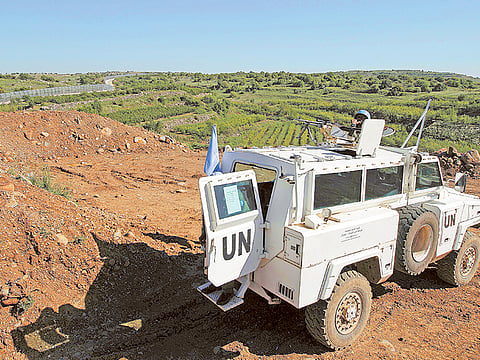Netanyahu’s Golan speech sends message to Putin
Israeli premier wants to send Russia a message that it will not be forced into peace talks with Syria

Beirut: Despite their colossal differences, Syrians on both sides of the spectrum were united in anger over Israeli Prime Minister Benjamin Netanyahu’s decision to hold his cabinet meeting on Sunday in the occupied Syrian Golan Heights. Adding insult to injury, the controversial session was held on the 70th anniversary of Syria’s independence from French rule.
Speaking while flanked by his top officials, Prime Minister Netanyahu vowed that the Golan will “forever” remain part of Israel, adding: “It is time, after 50 years, that the international community finally recognises that the Golan will forever remain under Israel’s sovereignty.”
Netanyahu also said that 50,000 Israelis live in the 30 Jewish colonies in the Golan, adding: “…thousands of families are supposed to join in the upcoming years”.
The Syrian Government objected with two official letters to the UN Security Council and to Secretary-General Ban Ki Moon, whereas its principal ally, Russian President Vladimir Putin, remained remarkably silent — raising a storm of speculation among Syrians.
Putin after all is expected to receive Netanyahu at the Kremlin next Thursday.
The two men met in Israel last September ahead of Putin’s landmark speech at the United Nations, where he stressed his support for President Bashar Al Assad, days before Russian military operations started in Syria.
The Israelis were briefed on Putin’s military strategy, and the two countries agreed on a mechanism to ensure that Israeli security is not threatened by the Russian bombing campaign in Syrian skies.
Since his return to office in 2009, Netanyahu has invested in solid relations with Moscow, trying hard to distance the Russians from Iran and Hezbollah, while Putin is adamant on preventing reconciliation between Ankara and Tel Aviv.
Not only has he been remarkably silent, if not silently supportive of Russia’s military operations in Syria, he seems to have reasoned that it is Putin and not Barack Obama taking charge of Syria policy at present.
At the Russian-US backed Syrian talks in Geneva, a clause was recently inserted by both the government delegation and that of the opposition calling for the full restoration of the occupied Golan Heights to Syria. Netanyahu, of course, was unhappy with the decision and he filed a complaint, not to Washington DC but to Moscow.
Apart from a brief 1998 track II channel with Damascus, conducted through Netanyahu’s friend Ronald Lauder, the Israeli premier was never enthusiastic about peace with the Syrians after the start of the Madrid Peace Process in 1991.
Behind closed doors, Syrians on both camps of the conflict feel that Russia has been given a green light by the Americans to handle the Middle East, while protecting Israeli interests in the region.
This means that if a political solution is hammered out on the Syrian crisis this year, Russia might try its hand further at regional peacemaking by kicking off the peace process that has been frozen since the last round of Syrian-Israeli talks collapsed in 2008.
The Israelis have already informed US Secretary of State John Kerry that it “will not oppose a diplomatic settlement in Syria” but did not comment on what the aftershocks of such a settlement would be, if Russia gets its way in Damascus.
Eight years ago, it was Turkey that tried, with no luck, to advance Syrian-Israeli peace talks, at the direct orders of Putin’s nemesis, Recep Tayyip Erdogan.
Putin believes that given his paramount standing in Syria today, he is capable of jumpstarting the process once again, this time, via Russian mediation. The last time Moscow tried its hand at Syrian-Israeli talks was with the Americans at Madrid in 1991. Between the years 1991-2000 the peace process was handled fully by the Bush and Clinton administrations.
Netanyahu realises that Putin’s regional ambitions go way further than ending the current war in Syria. Madrid, co-chaired by the two Super Powers, was effectively the beginning of the end of Soviet hegemony in the Middle East and the start of the so-called ‘American Era’ of direct intervention, which ended with Barack Obama’s election in 2009.
Putin sees Geneva today as “Madrid in Reverse”. It is the beginning of the end of the “American Era” and the start of what has been coined “Putinism” in the Arab World.
By convening his cabinet session in the Golan, Netanyahu is either sending an early message to the Kremlin about his lack of interest in talking peace with the Syrians, or raising the bar ahead of any talks that might be imposed upon him by Moscow.



